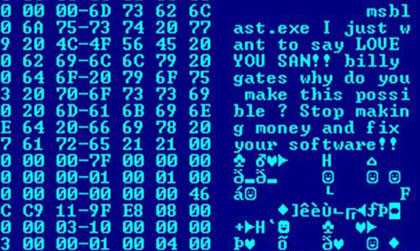|
File Binder
File binders are utility software that allow a user to "bind" multiple files together resulting in a single executable. They are commonly used by hackers to insert other programs such as Trojan horses into otherwise harmless files, making them more difficult to detect. Malware builders (such as keyloggers or stealers) often include a binder by default. A polymorphic packer is a file binder with a polymorphic engine. It thus has the ability to make its payload mutate over time, so it is more difficult to detect and remove. See also *Dendroid (malware) * MiniPanzer and MegaPanzer – Trojan horses that used file binders for distribution *Potentially unwanted program A potentially unwanted program (PUP) or potentially unwanted application (PUA) is software that a user may perceive as unwanted or unnecessary. It is used as a subjective tagging criterion by security and parental control products. Such software ma ... – sometimes have used file binders for distribution References ... [...More Info...] [...Related Items...] OR: [Wikipedia] [Google] [Baidu] |
Utility Software
Utility software is software designed to help analyze, configure, optimize or maintain a computer. It is used to support the computer infrastructure - in contrast to application software, which is aimed at directly performing tasks that benefit ordinary users. However, utilities often form part of the application . For example, a batch job may run user-written code to update a database and may then include a step that runs a utility to back up the database, or a job may run a utility to compress a disk before copying files. Although a basic set of utility programs is usually distributed with an operating system (OS), and this first party utility software is often considered part of the operating system, users often install replacements or additional utilities. Those utilities may provide additional facilities to carry out tasks that are beyond the capabilities of the operating system. Many utilities that might affect the entire computer system require the user to have elevated pri ... [...More Info...] [...Related Items...] OR: [Wikipedia] [Google] [Baidu] |
Hacker (computer Security)
A security hacker is someone who explores methods for breaching defenses and exploiting weaknesses in a computer system or network. Hackers may be motivated by a multitude of reasons, such as profit, protest, information gathering, challenge, recreation, or evaluation of a system weaknesses to assist in formulating defenses against potential hackers. The subculture that has evolved around hackers is often referred to as the "computer underground". Longstanding controversy surrounds the meaning of the term "hacker." In this controversy, computer programmers reclaim the term ''hacker'', arguing that it refers simply to someone with an advanced understanding of computers and computer networks and that ''cracker'' is the more appropriate term for those who break into computers, whether computer criminals ( black hats) or computer security experts ( white hats). A 2014 article noted that "the black-hat meaning still prevails among the general public". History Birth of subcult ... [...More Info...] [...Related Items...] OR: [Wikipedia] [Google] [Baidu] |
Trojan Horse (computing)
In computing, a Trojan horse is any malware that misleads users of its true intent. The term is derived from the Ancient Greek story of the deceptive Trojan Horse that led to the fall of the city of Troy. Trojans generally spread by some form of social engineering; for example, where a user is duped into executing an email attachment disguised to appear innocuous (e.g., a routine form to be filled in), or by clicking on some fake advertisement on social media or anywhere else. Although their payload can be anything, many modern forms act as a backdoor, contacting a controller who can then have unauthorized access to the affected computer. Ransomware attacks are often carried out using a Trojan. Unlike computer viruses and worms, Trojans generally do not attempt to inject themselves into other files or otherwise propagate themselves. Use of the term It's not clear where or when the concept, and this term for it, was first used, but by 1971 the first Unix manual assumed its r ... [...More Info...] [...Related Items...] OR: [Wikipedia] [Google] [Baidu] |
Malware
Malware (a portmanteau for ''malicious software'') is any software intentionally designed to cause disruption to a computer, server, client, or computer network, leak private information, gain unauthorized access to information or systems, deprive access to information, or which unknowingly interferes with the user's computer security and privacy. By contrast, software that causes harm due to some deficiency is typically described as a software bug. Malware poses serious problems to individuals and businesses on the Internet. According to Symantec's 2018 Internet Security Threat Report (ISTR), malware variants number has increased to 669,947,865 in 2017, which is twice as many malware variants as in 2016. Cybercrime, which includes malware attacks as well as other crimes committed by computer, was predicted to cost the world economy $6 trillion USD in 2021, and is increasing at a rate of 15% per year. Many types of malware exist, including computer viruses, worms, Trojan horses, ... [...More Info...] [...Related Items...] OR: [Wikipedia] [Google] [Baidu] |
Polymorphic Engine
A polymorphic engine (sometimes called mutation engine or mutating engine) is a software component that uses polymorphic code to alter the payload while preserving the same functionality. Polymorphic engines are used almost exclusively in malware, with the purpose of being harder for antivirus software to detect. They do so either by encrypting or obfuscating the malware payload. One common deployment is a file binder that weaves malware into normal files, such as office documents. Since this type of malware is usually polymorphic, it is also known as a ''polymorphic packer''. The engine of the Virut botnet A botnet is a group of Internet-connected devices, each of which runs one or more bots. Botnets can be used to perform Distributed Denial-of-Service (DDoS) attacks, steal data, send spam, and allow the attacker to access the device and its conn ... is an example of a polymorphic engine. References {{DEFAULTSORT:Polymorphic Engine Types of malware ... [...More Info...] [...Related Items...] OR: [Wikipedia] [Google] [Baidu] |
Payload (computing)
In computing and telecommunications, the payload is the part of transmitted data that is the actual intended message. Headers and metadata are sent only to enable payload delivery. In the context of a computer virus or worm, the payload is the portion of the malware which performs malicious action. The term is borrowed from transportation, where ''payload'' refers to the part of the load that ''pays'' for transportation. Networking In computer networking, data to be transmitted is the payload. It is almost always encapsulated in some type of frame format, composed of framing bits and a frame check sequence. Examples are Ethernet frames, Point-to-Point Protocol (PPP) frames, Fibre Channel frames, and V.42 modem frames. Programming In computer programming, the most common usage of the term is in the context of message protocols, to differentiate the protocol overhead from the actual data. For example, a JSON web service response might be: The string ''Hello, world!'' ... [...More Info...] [...Related Items...] OR: [Wikipedia] [Google] [Baidu] |
Dendroid (malware)
Dendroid is malware that affects Android OS and targets the mobile platform. It was first discovered in early of 2014 by Symantec and appeared in the underground for sale for $300. Certain features were noted as being used in Dendroid, such as the ability to hide from emulators at the time. When first discovered in 2014 it was one of the most sophisticated Android remote administration tools known at that time. It was one of the first Trojan applications to get past Google's Bouncer and caused researchers to warn about it being easier to create Android malware due to it. It also seems to have followed in the footsteps of Zeus and SpyEye by having simple-to-use command and control panels. The code appeared to be leaked somewhere around 2014. It was noted that an apk binder was included in the leak, which provided a simple way to bind Dendroid to legitimate applications. It is capable of: * Deleting call logs * Opening web pages * Dialing any number * Recording calls * SMS inte ... [...More Info...] [...Related Items...] OR: [Wikipedia] [Google] [Baidu] |
MiniPanzer And MegaPanzer
MiniPanzer and MegaPanzer are two variants of ''Bundestrojaner'' (German for federal Trojan horse) written for ERA IT Solutions (a Swiss federal government contractor) by software engineer Ruben Unteregger, and later used by Switzerland's Federal Department of Environment, Transport, Energy and Communications (UVEK) to intercept Skype and more generally voice over IP traffic on Windows XP systems. The source code of the program was released under the GNU General Public License version 3 (GPLv3) in 2009 by their author, who retained the copyright. Thereafter, the trojan was apparently detected in the wild. One of its designations given by anti-virus companies was ''Trojan.Peskyspy''. The malware used DLL injection In computer programming, DLL injection is a technique used for running code within the address space of another process by forcing it to load a dynamic-link library. DLL injection is often used by external programs to influence the behavior of .... References ... [...More Info...] [...Related Items...] OR: [Wikipedia] [Google] [Baidu] |
Potentially Unwanted Program
A potentially unwanted program (PUP) or potentially unwanted application (PUA) is software that a user may perceive as unwanted or unnecessary. It is used as a subjective tagging criterion by security and parental control products. Such software may use an implementation that can compromise privacy or weaken the computer's security. Companies often bundle a wanted program download with a wrapper application and may offer to install an unwanted application, and in some cases without providing a clear opt-out method. Antivirus companies define the software bundled as potentially unwanted programs which can include software that displays intrusive advertising (adware), or tracks the user's Internet usage to sell information to advertisers (spyware), injects its own advertising into web pages that a user looks at, or uses premium SMS services to rack up charges for the user. A growing number of open-source software projects have expressed dismay at third-party websites wrapping their d ... [...More Info...] [...Related Items...] OR: [Wikipedia] [Google] [Baidu] |
Hacking (computer Security)
Hacking may refer to: Places * Hacking, an area within Hietzing, Vienna, Austria People * Douglas Hewitt Hacking, 1st Baron Hacking (1884–1950), British Conservative politician * Ian Hacking (born 1936), Canadian philosopher of science * David Hacking, 3rd Baron Hacking (born 1938), British barrister and peer Sports * Hacking (falconry), the practice of raising falcons in captivity then later releasing into the wild * Hacking (rugby), tripping an opposing player * Pleasure riding, horseback riding for purely recreational purposes, also called hacking * Shin-kicking, an English martial art also called hacking Technology * Hacker, a computer expert with advanced technical knowledge ** Hacker culture, activity within the computer programmer subculture * Security hacker, someone who breaches defenses in a computer system ** Cybercrime, which involves security hacking * Phone hacking, gaining unauthorized access to phones * ROM hacking, the process of modifying a video game's pr ... [...More Info...] [...Related Items...] OR: [Wikipedia] [Google] [Baidu] |

